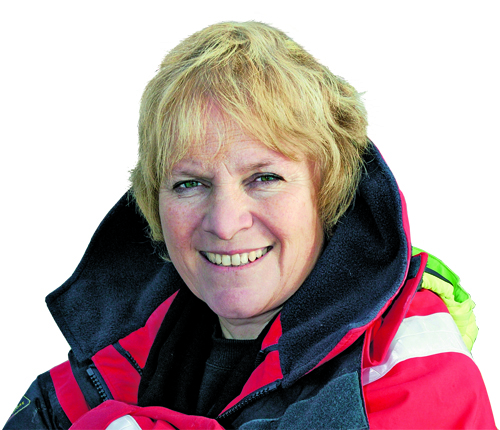It’s easy to keep sailing in familiar waters, but a longer passage will connect you to the true spirit of seafaring, says Libby Purves
Libby Purves: It’s good to see Expert On Board this month advising on longer passages and how to prepare. Too many of us, for too long, settle for the Channel crossing, the Irish hop, the coasting cruise. They are pleasant, and often actually more challenging than a blue water trip; and when you’re new to it a safe arrival in Cherbourg makes you feel like Magellan or Columbus. Actually, with a seriously foul spring tide, getting the dinghy back from Snape against the flood can bring on the same rush of satisfaction.
But the fact is that a lot of us need and want something different. Not just a healthy, skilled, sociable race round the cans, not just a relaxed holiday: something else. We want to feel connected to the ancient history of seafaring. To Vikings, and explorers, and naval expeditions. We want to taste a little of what sailors through the ages have sung and written about: long days and nights far from land, encircled by an ever-changing, unpredictable circle of horizon.
We want the experience of eking out food and checking water supplies, feeling utterly self-sufficient on mile-deep water, understanding the physical rhythms which set themselves up when you keep four-hour watches round the clock. We will discover which books truly engross us in the long hours in our bunks. We try astro-navigation, and (if going West) reach the astonished moment after a week or two when you start to guess how far you’ve come by just reading the noon sight off the sextant’s scale. We want the immense thrill of a long-distance landfall: that single cloud lying low over what might be an island, that high peak spotted hours ahead which then vanishes and throws you back into doubt – was it just a trick of the light on choppy water? – until it reappears, closer and darker, unmistakable. We will experience, too, the sadnesses of that landfall, perhaps especially strong on tall-ship passages, as crewmates’ mobile phones suddenly spring to life and our tight little community of strangers is fractured by more powerful, distant intimacies.
So, yearning for that experience (though warily) we sign on as oceanic delivery crews or for 12-day tall-ships races when young. Later, we might join the ARC, or go it alone. Perhaps at first just for four or five days, then daring longer trips, boning up on how to fix the water-maker, beefing up the first-aid box, and discovering the hard way that no food keeps as reliably at sea as white sliced bread (Mothers Pride is Sailors’ Saviour), and of course onions. HW Tilman was no fool when he said, ‘Never board a ship without an onion’, because a few slivers in a tedious tinned stew make all the difference.
Off to sea, then. Write in the log, never putting, ‘Falmouth to Newport’ because that is bad luck, but, ‘Falmouth towards Newport’. Check the food and water, drop the warps, point seawards with courage. For despite the GPS, the satphone, EPIRBs and tracking bleepers, when land drops astern and a couple of days pass, you’re on your own. There is really no point in the weather forecast because it’s coming your way whatever you do, and the sea feels bigger than ever was the case on coastal passages. Recite Arthur Hugh Clough: ‘Where lies the land to which the ship would go? /Far, far ahead, is all her seamen know. /And where the land she travels from?/ Away! Far, far behind, is all that they can say.’ Reach out your hand and the spirits of long-ago captains and crews will reach back, reassuring.
Sea is the place to be. And frankly, terrifying as it can be in bad weather, the great thing about a blue-water passage is that it compels you to be braver than usual because if you aren’t, it’ll do you no good at all. Or as Clough put it, ‘Proud to fight with wind and wave, the dripping sailor on the reeling mast, exults to bear, and scorns to wish it past.’ Well, he was a poet, in a warm room, and you’ll wish it past all right, as we all do. But it’s worth it.
How to plan and sail an offshore passage
James Stevens stands by as Becca Morley steps up to plan and sail her first big offshore passage as skipper
Free offshore cruising seminars
At Southampton
On and Offshore
Yachting Monthly's features editor Dick Durham will be talking about his escapades in deep water and shoal tomorrow
Libby Purves Podcast February 2017
Now’s the time to traipse around boatyards and shows, dreaming of a new boat, if only the money would stretch,…
Libby Purves December 2016 Podcast
We may think we understand the sea, but it’s not until you get in it that you realise how volatile…
Libby Purves November 2016 Podcast
A healthy fear of the sea comes with experience, but new crew remind us why we fell in love with…







